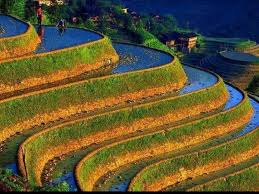Banaue Rice Terraces, Philippines
📌 Extra Travel Information – Banaue Rice Terraces
📅 Best Time to Visit:
-
April to May and October to early December are ideal:
-
Terraces are greenest and lush between May–June (just before harvest).
-
Avoid July–September (rainy season) due to mudslides and slippery trails.
-
🎉 Cultural Events:
-
Imbayah Festival (April): A grand Ifugao celebration held every three years — features tribal sports, woodcarving, native dances, and rice wine drinking.
-
Gotad ad Ifugao (June): Province-wide foundation festival with ethnic games, traditional clothing, and parades.
🎒 Recommended Gear:
-
Waterproof daypack
-
Trekking pole (for Batad trails)
-
Insect repellent (especially during the rainy season)
-
Camera with wide-angle lens (panoramic shots are stunning!)
🏡 Where to Stay:
-
🛖 Batad Transient House – Rustic, with terrace views and local meals
-
🛌 Banaue Ethnic Village & Pine Forest Resort – For groups or cultural immersion
-
🏠 Ramon’s Native Homestay – Stay in a traditional Ifugao hut, complete with cultural stories
🛍️ What to Bring Back:
-
Handwoven Ifugao textiles and scarves
-
Locally carved wooden rice gods (Bul-ul)
-
Mountain-grown organic coffee beans
-
Handcrafted jewelry made from bone, wood, and natural stones
🧭 Travel Tips:
-
No ATMs in Banaue town — bring enough cash.
-
Electricity and signal can be spotty, especially in remote villages like Batad.
-
Pack warm clothing — temperatures drop significantly at night, especially during December–February.
-
Wear hiking shoes — many terraces require steep treks or muddy footpaths.
-
Always hire a local guide to support the community and ensure you don’t get lost in the mountain trails.
-
Respect local customs — do not enter rice paddies or homes without permission.


